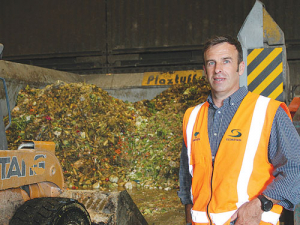They were blown away by the innovation and technology involved in the system which takes former foodstuffs and converts it into cattle feed; and the prototype biogas site which takes cow manure and food waste and converts it into fertiliser and biogas.
The young people could see that the wider dairy industry can be up to date, technologically savvy and environmentally conscious.
He says the young people were enthused by the positive environmental side to the business, the tracking of sustainability and the fact they are taking products like packaged unsold dairy products, depacking them and reprocessing as stockfeed for a range of animals.
Eco Stock also takes dry food such as biscuits, bread, cakes, breakfast cereal, etc for recovery, reprocessing and conversion. They make a high-energy palatable stock feed for all animals including cattle, sheep, poultry and pigs.
Fisher reckons the feed they supplied to dairy farmers in 2011 converted to milk solids was worth about $24 million a year in additional export earnings.
A former NZ Army engineer officer who was raised on a small Canterbury farm, Fisher started Eco Stock in 2007.
Fisher says they take in the equivalent of eight double-decker buses a day in pre-consumer food waste for seven days a week.
The operation has two sides. The feed side is off the back of what is called “former foodstuffs” in Europe which has a whole industry based on it.
“It is a well-documented industry and EcoStock benchmarks itself off those guys. I visit them every year.”
All the material is pre-consumer waste; it comes from the manufacturing plant and hasn’t reached retail.
All the companies Eco Stock works with have overseas executives/management because he says they are far more familiar with the concept and challenge their own internal systems; they know reject lines are not waste and can be recovered and re-processed.
He reckons food manufacturers can cut a waste bill of, say, $750,000 a year down to $100,000 and cut their carbon footprint.
They have five very complex unpacking lines that can, for example, put the equivalent of two Toyota Hilux loads of chocolate bars per hour through each machine. That can’t be done by hand.
Food manufacturers in New Zealand don’t have the same incentives to do what they do in Europe and America, he says. Our landfill tax is $10/t – the lowest in the OECD, he claims. Everyone else’s is $130-$180/t.
However he has noticed in the last three months with Labour and Greens in power that sustainability managers are starting to get voices within their companies.
Fisher says every manufacturing process will have start-of-line, end-of-line, trials, retained stock, undersold stock, under-confidence in a mix, R&D trials and such like.
Overseas they are not embarrassed about it. They understand the culture of quality assurance and some encourage staff in this respect. The industry standard for rejects is 2-3% so anything below that is not necessarily a good sign.
Eco Stock cannot use anything for feed which contains meat or gelatine; many lollies have gelatine.
















